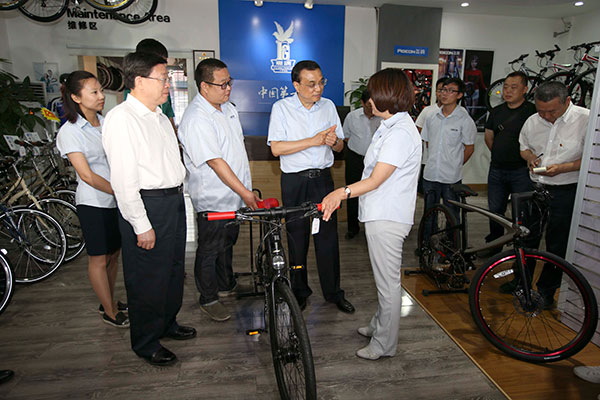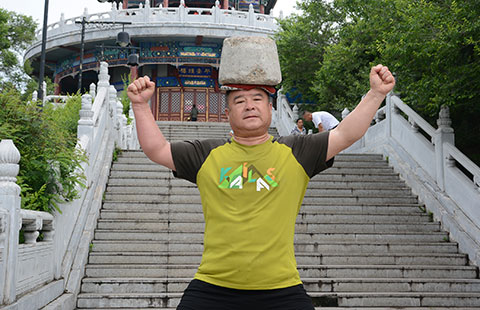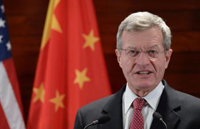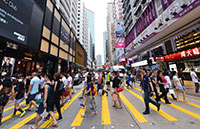Li gets reform message across on Tianjin visits
By ZHAO HUANXIN in Tianjin (China Daily) Updated: 2016-06-27 03:31
 |
|
Premier Li Keqiang has called for the forging of “hundred-year-old brands” among China’s traditional enterprises during a visit to a Flying Pigeon bicycle experience store in Tianjin on June 26. [Photo/english.gov.cn] |
Premier Li Keqiang visited an old State-owned firm revitalized by innovation, talked to executives of a cloud computing startup and rode a "super smart bicycle" during a tour of the northern port city of Tianjin on Sunday afternoon.
The message he wanted to get through is clear: China should count on reform and innovation to replace old drivers of growth with new ones, and push ahead with industrial upgrading.
At the Tianjin Optical Electrical Group, the maker of China's first laser printer, Li said he was glad to learn that the State-owned company, which is more than 60 years old, is encouraging its innovators to launch new enterprises and turn their ideas into marketable products.
The company sank 132 million yuan ($20 million), or 5.1 percent of its turnover, into research and development last year, paving the way for it to transform its traditional growth mode.
"For State-owned enterprises to surf the waves of the market safely, they must engage themselves in business startups and innovation, which are their ‘surfboards'," Li said.
To step up industrial upgrading, Tianjin has launched a "Little Giants" program to groom high-tech startups.
One of these is Troila Technology, founded by a 23-year-old college graduate six years ago to provide cloud computing services.
Cloud computing enables enterprises to dispense with building and maintaining computing infrastructure in-house, avoiding upfront infrastructure costs.
Zhang Kunyu, chairman of Troila Technology, said the company's solution allowed businesses to have access to at least 6,000 software products at a cost of only a few hundred yuan a year.
"This has greatly empowered the innovation capacity of the startups," Zhang said, adding that the company had created a platform to link 14,312 companies it is serving to seven government agencies and several banks to slash administrative procedures and help them to obtain loans.
Li said while visiting Troila Technology that China should encourage the creation of more such service platforms by combining the resources of the government and enterprises to help traditional companies with upgrading and reduction of overcapacity.
On the last leg of his tour, Li rode a "super smart bicycle" at an exhibition booth of the Tianjin Flying Pigeon company.
Tianjin is China's bicycle city, just as Detroit is the US' automotive hub. However, sales of its Flying Pigeon, touted as the country's first bicycle brand, have dropped by 20 percent annually in recent years.
But Flying Pigeons started to fly high again last year, thanks to the development of smart bikes in cooperation with Beijing LeEco, a technology startup. Riders can now configure settings according to their health and road conditions, enjoy music and communicate with others.
Li said he expects entrepreneurialism and a spirit of craftsmanship to help make China's traditional industry more competitive and adaptable to different customers' needs.
His Tianjin tour was made a day before the Annual Meeting of the New Champions 2016, also known as the Summer Davos Forum.
Li also met with the World Economic Forum President Klaus Schwab on Sunday evening.
- Joint boost pledged for world peace
- China to recruit lawyers, legal experts to draft bills
- Lack of tents, shelter for Funing tornado victims
- Rocket takes China closer to space station
- What you need to know about Jiangsu's deadly tornado
- China faces challenges in tornado forecast: weather authority
- Ruling may 'open Pandora's box'
- Poverty funds facing stiffer supervision
- Guns a growing factor in narcotics enforcement
- China issues disaster alerts










